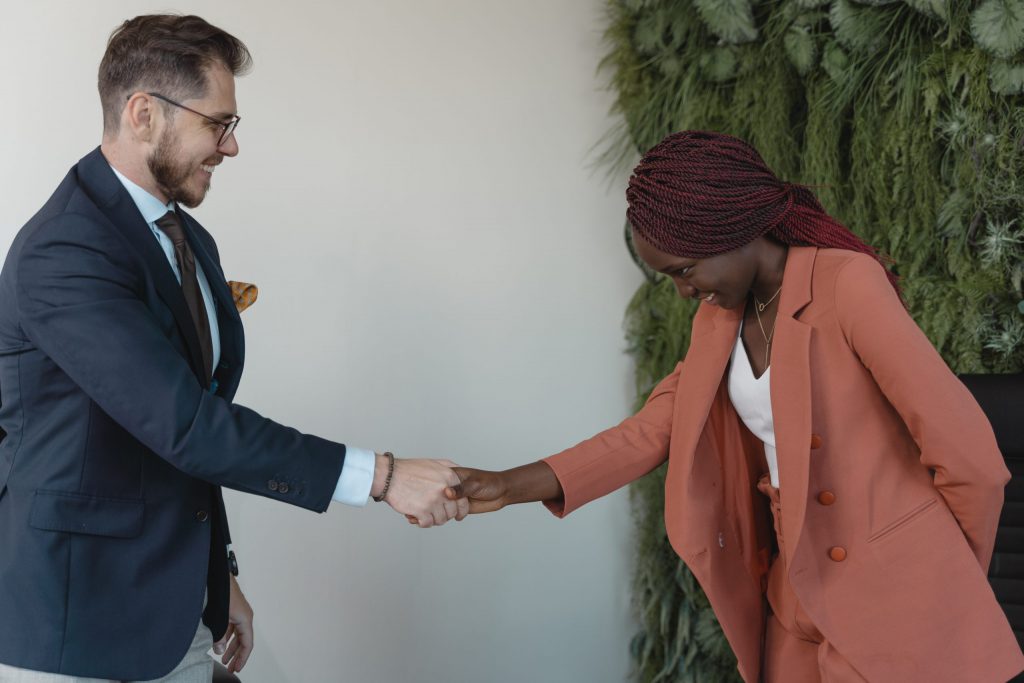If you want a job in the United States, chances are you’ll have to go through the job interview process first. Most job interviews are face-to-face, usually at the employer’s office, but others may be conducted remotely over the internet. No matter the medium, we have some tried and true rules to follow when preparing for an interview that will give you the best chances of success!
What should I wear to a job interview?
Ensure the clothes that you’ll wear for your interview are ready and laid out the day before. The last thing you want is to be stressing over clothes on the morning of your big day. Most job interviews require a formal dress code unless they specifically say otherwise. Formal is just another word for business wear, so a suit is appropriate for a man and a woman, or for the latter, a dress with a blazer.
Suits and dresses should not be flashy. You should be making a statement with your personality, not your clothes. Keep your outfit muted with colors such as black, grey, white, or navy so it doesn’t serve as a distraction. The same rule applies to accessories, including scarves, ties, tights, shoes, and bags.
Women should keep jewelry to a minimum and wear shoes with a heel no more than three inches. Do not show cleavage as this can be seen as unprofessional.
For men, ties should be appropriate (no cartoon characters, for example), and shirts should be white or pale blue. Your suit needs to fit you well, so get yourself measured by a professional tailor. Tailored suits can be expensive so ask about sale items and shop around.
What is business casual?
On the other hand, your interviewer may ask you to dress ‘business casual.’ This may sound confusing and counterintuitive, but there are a few rules you can follow to make sure you dress the part. Do not wear jeans or sneakers but try black, navy, or khaki pants. Start with formal wear and work backwards. For men, you may not need a suit jacket or tie, but a collared shirt is a must. For women, pair a nice blouse with formal trousers or a skirt. A dress that is not too showy is also a great option.

What questions will I be asked in the interview?
You won’t know ahead of time the exact questions the interviewer will ask, but taking adequate time to prepare for your interview beforehand is essential to your success. The interviewer will be able to tell rather quickly if you have come unprepared, which implies that you have no motivation or enthusiasm for the job. To get an inkling for the potential questions the interviewer will ask, start by researching the company yourself. What’s their main selling point? What will you be doing in this role? What is their workplace culture like? What are their values? Better yet, if you know someone who works at the company or find one of their employees on LinkedIn, you can always send them a message or chat with them to get a better idea of what to expect. It’s also a good idea to reach out to your interviewer to ask if there are any specific tasks they would like you to complete ahead of the interview.
What is the best way to prepare my answers?
Practice makes perfect. Most interviews are only 30 minutes long. That may seem like a vast amount of time when you’re waiting for a bus, but at a job interview, it races by. Make sure you know your best qualities and can share these in a short but meaningful way. You shouldn’t be rambling or coming up with new ideas in an interview. Instead, prepare answers in your head beforehand that share your strengths.
You should also be aware of one of the most common question that employers like to ask: “What are your weaknesses?” The interviewer is checking for two personal traits with this question: your self-awareness and your approach to obstacles in the past and how you overcame them. There is no ‘right’ answer and you can choose between a hard skill such as writing and a soft skill like delegating tasks. Make sure it is workplace-related and don’t use a weakness wherein you essentially compliment yourself, such as “I am a perfectionist” or “I work too hard.” Pick a weakness that is unrelated to a critical skill or task you will be performing on the job. For example, a person interviewing at an advertising agency should not highlight his inability to be creative.
Turn your weakness into a positive by explaining what you are currently doing to improve it, with concrete examples. For example, maybe you have trouble delegating tasks and have realized that doing it all yourself actually slows down progress on a project. To work on this, you have enrolled in a management seminar or started delegating one or two small tasks a day to someone else.
In addition to the weaknesses question, there are several common interview questions that you can prepare for that are specific to your industry. For example, if you’re hoping to work in the hospitality trade, google ‘most common hospitality job interview questions’ to get started.
How do I make a good first impression?
A great first impression is vital in interviews. Get to the interview early so you have enough time to park, find the place, check in, and prepare yourself. When you enter the interview room, make sure you arrive with enthusiasm and passion. Thank your interviewers for their time. Remember, they could be interviewing many candidates throughout the day. If your interview is in-person, usually you would greet your interviewers with a friendly handshake. This may not always be the case, especially because of COVID-19, so instead it’s best to follow specific instructions given to you by your interviewer.
If your interview is online, make sure you have prepared adequately beforehand. Does your web camera and microphone work? If you know your interview will take place over Zoom or Skype, ensure you are already familiar with these applications so you can quickly handle any potential issues. Your webcam must be switched on. Employers would like to see your face and may not feel comfortable without video. Be sure to sit in a quiet area, alone, and without any background noise. Turn off your cell phone notifications and if you are in front of a computer, close any websites you may have up that could distract you.
What about my immigration status?
If you have a green card or an approved H-1B visa, then you are authorized to work in the US. If this applies to you, tick this box on the application. If you are unauthorized to work in the United States, tick the ‘other’ box and explain your situation to the interviewer when asked. Employers are not allowed to discriminate against candidates, but they’re also not permitted to offer jobs to candidates who are not authorized to work in the US.
During your interview, use your experience as an immigrant to your advantage. You have already proven that you are willing to take risks and be independent. Though you don’t want to focus on any negatives, share the obstacles you’ve encountered in moving to America and how you’ve overcame them. The fact that you are searching for a job suggests that you want to stay here and build a life for you and your family. These are all positives unique to you. This shows the interviewer your tenacity, loyalty, and experience, which are all valuable traits employers are looking for in today’s workplace!

What questions will I be asked in the interview?
You won’t know ahead of time the exact questions the interviewer will ask, but taking adequate time to prepare for your interview beforehand is essential to your success. The interviewer will be able to tell rather quickly if you have come unprepared, which implies that you have no motivation or enthusiasm for the job. To get an inkling for the potential questions the interviewer will ask, start by researching the company yourself. What’s their main selling point? What will you be doing in this role? What is their workplace culture like? What are their values? Better yet, if you know someone who works at the company or find one of their employees on LinkedIn, you can always send them a message or chat with them to get a better idea of what to expect. It’s also a good idea to reach out to your interviewer to ask if there are any specific tasks they would like you to complete ahead of the interview.
What is the best way to prepare my answers?
Practice makes perfect. Most interviews are only 30 minutes long. That may seem like a vast amount of time when you’re waiting for a bus, but at a job interview, it races by. Make sure you know your best qualities and can share these in a short but meaningful way. You shouldn’t be rambling or coming up with new ideas in an interview. Instead, prepare answers in your head beforehand that share your strengths.
What should I do post-interview?
Before concluding the interview, be sure to ask questions of your own. Prepare 2 or 3 questions beforehand about the topics that matter the most to you. This could be about the workplace culture, the specific projects you will be working on, and what a typical day on the job looks like. Not asking any questions tells the interviewer that you’re not really interested in the job. Show them your enthusiasm!
At the end of the interview, the interviewer may give you a timeline regarding when you should expect to hear their hiring decision. Keep in mind that employers in America are not required to notify interviewees who were not selected for the job. Usually, the Human Resources department of large organizations, or sometimes even the interviewer, send their regrets through e-mail or you may not hear back from them at all. It is up to the individual employer’s policies whether or not they notify you about the decision.
In corporate America, it is usually frowned upon to call employers and ask for an update on your hiring status. Companies may say “no phone calls, please” on the job application or remind you at the end of the interview that only the job candidate to be hired will be notified. If the interviewer doesn’t give you a timeline, don’t be afraid to ask! Before leaving, remember to thank him or her for their time and reiterate your interest and enthusiasm for the job. Post-interview, it is not uncommon to send a thank you note or an e-mail to the interviewer to once again thank them for their time and remind them of your interest in the job.
As a new immigrant or refugee to the United States, you will find that our robust economy offers a wealth of job opportunities. Following these interview tips will help increase your chances of landing your dream job.
Want to practice a mock interview? Looking for a job? Golden Beacon USA’s career coaching services are here to help you find, apply, and interview for your dream job! Contact us today at info@goldenbeaconusa.com or call or text (866) 403-7173 to get started!
